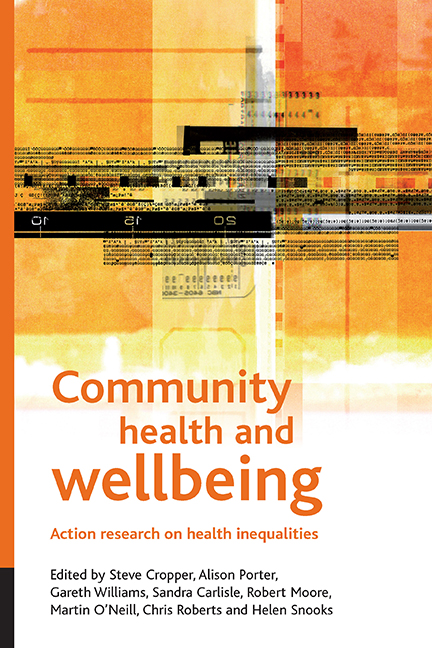Book contents
- Frontmatter
- Contents
- List of tables and figures
- Preface
- Acknowledgements
- Notes on contributors
- one Health inequalities in their place
- two ‘Policy experiments’: policy making, implementation and learning
- three Policy innovation to tackle health inequalities
- four Action research partnerships: contributing to evidence and intelligent change
- five Engaging with communities
- six The role of the community-based action researcher
- seven Evaluation, evidence and learning in community-based action research
- eight Social theory, social policy and sustainable communities
- nine Beyond the experimenting society
- Index
- SHARP DVD: A Way of Working Together to Improve Our Lives
Preface
Published online by Cambridge University Press: 15 September 2022
- Frontmatter
- Contents
- List of tables and figures
- Preface
- Acknowledgements
- Notes on contributors
- one Health inequalities in their place
- two ‘Policy experiments’: policy making, implementation and learning
- three Policy innovation to tackle health inequalities
- four Action research partnerships: contributing to evidence and intelligent change
- five Engaging with communities
- six The role of the community-based action researcher
- seven Evaluation, evidence and learning in community-based action research
- eight Social theory, social policy and sustainable communities
- nine Beyond the experimenting society
- Index
- SHARP DVD: A Way of Working Together to Improve Our Lives
Summary
The characteristic government approach to reducing the demand on healthcare services is to exhort individuals to change their behaviour, through adopting healthier lifestyles. There are three problems with this approach. First, the growing body of evidence available on health inequalities – evidence that is much more powerful than it was when the Black Report was produced – suggests that what happens ‘upstream’ is determined by large-scale social and economic forces that are beyond the control of individuals or households. Second, many policies and programmes aimed at changing health behaviour to reduce the risk of later ill health have been successful for some groups in the population but not for others, thus widening the health gap between rich and poor, or between middle class and working class. Third, much poor health is located in particular areas characterised by multiple deprivation and forms of social exclusion. Looked at in this way, many problems that are usually regarded as the responsibility of different departments of government – crime, poor housing, poor educational attainment and chronic ill health – are seen to be interconnected in ways that require the search for ‘joined-up’ solutions. The search for effective solutions to complex and interconnected problems, or ‘wicked issues’, has led to a growing emphasis on the need to examine what works: to develop ways of evaluating whether the policies and initiatives in which national and local government invests actually succeed; and to do so in a way that does not add to the sense of exclusion of those who are the targets of the initiatives. This book aims to contribute to that search.
This book is the outcome of an innovative five-year programme to explore the potential of action research as an approach to addressing health inequalities. The Sustainable Health Action Research Programme (SHARP), which was funded by the Welsh Assembly Government through its Health Promotion Division (now the Health Improvement Division), consisted of seven projects. All involved public service agencies, academic institutions and communities as partners, but each was distinctively shaped by its particular sectoral and/or institutional affiliation (health, local government, youth service, further and higher education); the communities it was working with and for (geographical communities, communities of identity, urban/rural); and the forms of investment and intervention chosen by each project.
- Type
- Chapter
- Information
- Community Health and WellbeingAction Research on Health Inequalities, pp. vii - xiiPublisher: Bristol University PressPrint publication year: 2007



